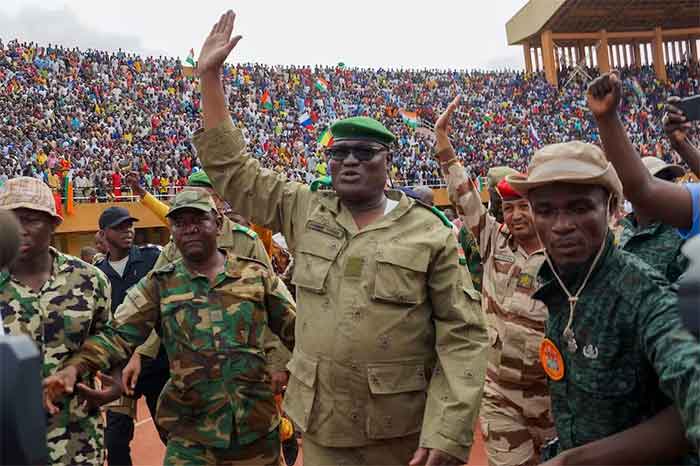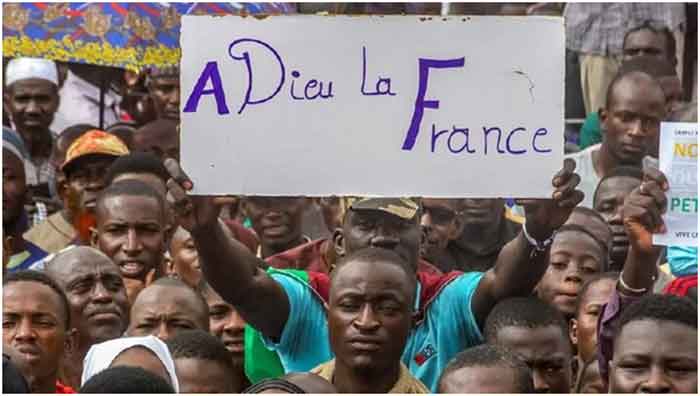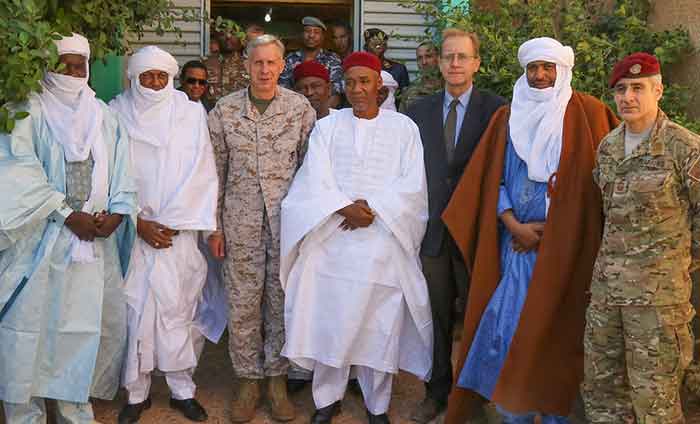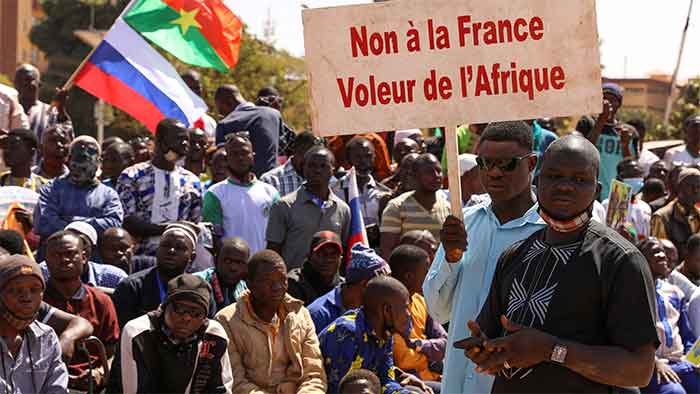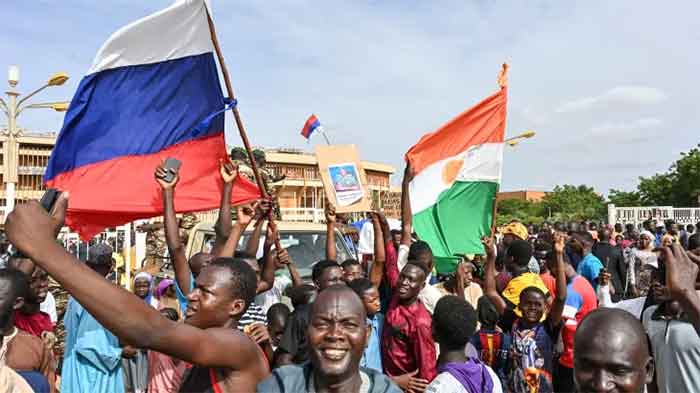
The French government announced on Sunday that it is halting financial assistance to Burkina Faso over the West African nation’s stance on the coup in Niger.
“France suspends, until further notice, all its development aid and budget support actions in Burkina Faso,” the ministry said in a statement, without elaborating.
The decision comes just days after the ruling juntas in Burkina Faso and Mali declared their support for Niger’s coup leaders, and threatened to treat any armed intervention against Niamey’s new military leadership as a declaration of war.
The coup in Niger on July 26 saw President Mohamed Bazoum deposed and detained, and national institutions shut down. The military explained that they had decided to “put an end to the deteriorating security situation and bad governance.”
Bazoum, who was elected in 2021, welcomed 1,500 French troops into Niger last year to fight a jihadist insurgency in Africa’s Sahel region, after France withdrew from Mali due to a deterioration in relations with the leadership there.
France has expressed alarm over the situation facing its only remaining military partner in the Sahel region, and like other Western and regional leaders, has condemned the power grab.
The ousted government’s allies, including France, have imposed sanctions in an attempt to force the military leaders to restore constitutional order, but General Abdourahamane Tchiani – the head of the transitional government – has said he will not submit to threats.
The Economic Community of West African States (ECOWAS) issued a one-week ultimatum to the military leadership last week, warning it would send in troops if Tchiani and his cabinet of generals did not relinquish power and restore President Bazoum. The deadline expired on Sunday, prompting the military government to shut down the nation’s airspace until further notice.
Last week, Niger’s new junta revoked five military deals with France dating between 1977 and 2020, amid a growing wave of anti-French protests, with some locals accusing the former colonial power of meddling in their affairs.
Air France Halts Flights To Burkina Faso And Mali
Another media report said:
Air France announced on Monday that it had halted flights to and from Burkina Faso and Mali until August 11, following the closure of Niger’s airspace.
Earlier this year, Burkina Faso terminated a military agreement that permitted French forces to fight Islamist insurgencies linked to al Qaeda and Islamic State. The military government insisted that Ouagadougou would independently defend itself against militant threats.
French News Channel Banned
An earlier report said:
Burkina Faso’s media regulator, the Superior Communication Council (CSC), has temporarily suspended French news channel LCI over claims of spreading false information about jihadist violence.
In a statement, the CSC criticized the channel belonging to the TF1 group over alleged remarks by journalist Abnousse Shalmani.
According to the regulatory body, Shalmani stated in an April broadcast that jihadists were “advancing rapidly” and that state troops were using volunteers from the local defense force as shields to protect themselves from the onslaught.
The CSC is cited by the outlet Aujourd’hui au Faso as saying that the journalist specified, “without mentioning a source, that 40% of the territory is occupied by ‘jihadists’ or that nearly 90,000 civilians called Volunteers for the Defense of the Homeland are used as cannon fodder to protect the Burkinabe soldiers against terrorists.”
The regulator said the reports are “simple speculations and malicious insinuations” that are “likely to create unrest within the populations and to weaken the necessary collaboration sought between the army and the civilians.”
The West African country has been engulfed in a spiral of jihadist insurgencies for nearly a decade. More than 10,000 civilians and military personnel have died, according to estimates from non-governmental organizations. In a recent report, the UN’s humanitarian agency said Burkina Faso experienced substantial increases in terrorism, with deaths increasing by 50% in 2022.
French Journalists Expelled
A media report said:
Burkina Faso’s military government has expelled two French reporters working for the Le Monde and Liberation newspapers.
Liberation’s correspondent Agnes Faivre and Le Monde’s Sophie Douce were both expelled on April 1 after being summoned separately for questioning by the military authorities on Friday. They were given 24 hours to leave Burkina Faso.
In a statement published on its website Sunday, Liberation claimed the expulsion of the journalists was “confrontation that the freedom of the press in Burkina Faso is seriously threatened.”
According to the newspaper, the expulsion follows a March 27 story that showed a video of children and adolescents allegedly being “executed in a military barracks, by at least one soldier.”
Although the government of the African state has yet to explain the dismissals, Liberation claims that the story “obviously greatly displeased the ruling junta.”
“The Burkinabe government, which had not reacted before publication when Liberation had asked for it, had spoken of ‘manipulations for political purposes’ and of a “desire to ‘discredit’ the army,” the outlet noted.
The paper protested what it called unjustified expulsions, and said the two journalists were of “ideal integrity” and had worked in Burkina Faso legally with “legitimate visas and accreditations.”
Relations between Paris and Ouagadougou have weakened remarkably since Burkina Faso’s military seized power in a coup in October last year.
Le Monde director Jerome Fenoglio said the expulsions “a new major setback in the freedom to inform on the situation in Burkina Faso,” He urged the government to reverse the decisions “as quickly as possible and to immediately restore the conditions for independent information in the country.”
French State TV Banned
The former French colony Burkina Faso’s military government has banned the France24 TV channel, after it broadcast an interview with the leader of Al Qaeda’s North African offshoot. While French and Burkinabe troops recently fought jihadists together, the African nation cut its ties with its former colonizer master this year.
“France 24 is not only acting as a mouthpiece for these terrorists, but worse, it is providing a space for the legitimization of terrorist actions and hate speech,” Burkina Faso’s minister of communication, Jean-Emmanuel Ouedraogo, said in a statement on Monday.
Earlier this month, the French state-owned broadcaster interviewed Yezid Mebarek, who took the helm of Al Qaeda in the Islamic Maghreb (AQIB) in 2020 after French forces killed his predecessor, Abdelmalek Droukdel, in a raid in neighboring Mali.
France24 said that the statement was based on “unfounded allegations,” and that it never gave Mebarek “the floor directly.” The channel said in a statement that it reported the terrorist leader’s words via one of its journalists.
The dispute comes amid growing dissatisfaction with France in Burkina Faso and the wider Sahel region. French forces have been deployed in West Africa since 2013, and launched numerous anti-terror raids in Burkina Faso until their presence in the country was formalized in a 2018 agreement with Burkinabe authorities.
However, the troops were given one month to leave the country in January, after the Burkinabe military seized power in a coup in October. Earlier this month, the Burkinabe foreign ministry scrapped a 1961 agreement on military assistance with France, which had been in force since Paris granted the Republic of Upper Volta, as Burkina Faso was previously known, its independence.
A similar situation developed in Mali, with Colonel Assimi Goita ordering the French military to leave his country last year after coming to power in a coup in 2021.
France’s Failure To Contain Jihadist Insurgency
In Burkina Faso and Mali, anger had grown over France’s failure to contain a region-wide jihadist insurgency. Both have since strengthened diplomatic ties with Russia, and looked to Moscow for military assistance in the fight against terrorism.
Burkina Faso also banned broadcasts of Radio France International in December, accusing the French network of false reporting and giving a platform to jihadist groups.
Military Pact With France Scrapped
An earlier AFP report said:
Burkina Faso has officially renounced a military assistance agreement with France and has given its former colonial ruler 30 days to withdraw all military personnel from the West African country. The French authorities reportedly received formal notice of the decision on Wednesday.
A letter from the Burkinabe Foreign Ministry, dated Tuesday, informed France that Burkina Faso was “renouncing the technical military agreement reached in Paris on April 24, 1961.”
The treaty was concluded just months after the former colony of Upper Volta had gained independence from France. It was the legal basis for French military intervention in the country against jihadist militants that have terrorized the Sahel since the 2011 NATO-backed regime change in Libya.
Ouagadougou’s move comes just days after France lowered the flag on its military base near the Burkinabe capital and withdrew some 400 troops that had previously been deployed on a counter-insurgency mission. Ambassador Luc Hallade was recalled to Paris for consultations in mid-January, after Burkina Faso demanded his departure.
Burkinabe Prime Minister Apollinaire Kyelem de Tambela has reportedly declared Russia to be a “reasonable” choice of new partner in the fight against the militants. This would make Burkina Faso the third former French colony in Africa to show Paris the door and turn to Moscow for military aid, after Mali and the Central African Republic.
French President Emmanuel Macron has sought to describe the process as a “reorganization” and “not a withdrawal” from the continent. France sought to have a “reduced footprint” in favor of a greater presence of “our African partners,” he said at the Elysee Palace on Monday, ahead of a trip to Angola, Gabon, and the two Congos.
Last month, France accused Russia of “neocolonial political involvement” in Africa, after Russia declared the age of French imperialism over.
Burkina Faso’s President Looks To Russia For Strategic Alliance
Russia has become a strategic ally for Burkina Faso, the junta’s president, Ibrahim Traore, said on Thursday, speaking about the country’s “new forms of cooperation” following the expulsion of French troops.
“The departure of the French army does not mean that France is not an ally. We have strategic allies too. Russia, for example, is a strategic ally.”
The West African country terminated a 2018 military agreement that allowed French and Burkinabe troops to fight jihadists together, citing military failures in tackling the security threat, which the UN said has displaced 2.5 million people.
Western nations have repeatedly raised concerns about Russia’s growing influence in Africa’s Sahel and border regions, with Paris blaming Moscow for anti-French sentiment in Burkina Faso and Mali.
According to reports, the private Russian military group Wagner has been involved in training the Burkinabe Army, providing intelligence support, and carrying out combat operations against militants in the country’s north.
The military government’s leader, on the other hand, denied reports of Wagner forces operating in Ouagadougou, saying “our army fights alone.”
He stated that Moscow is a major supplier of military equipment to the country, which has been faced with protracted jihadist insurgencies since 2013, and that he is “satisfied with the cooperation,” which he described as “frank.”
Moscow has also dismissed allegations of Wagner’s presence in Burkina Faso, with Deputy Foreign Minister Mikhail Bogdanov calling them unfounded. Russia’s ambassador to the Ivory Coast and Burkina Faso, Aleksey Saltykov, reaffirmed the Kremlin’s commitment to improving relations with Ouagadougou, where it hopes to reopen its consulate, which was closed in 1992.
Joint Russia-Africa Bank Proposed
Burkina Faso has suggested creating a joint bank with Russia to facilitate financial transactions between the two countries and promote trade, the speaker of the Transitional Legislative Assembly, Ousmane Bougouma, said on Wednesday.
“I think that when it comes to strengthening cooperation with Russia in key areas of the economy, it is very important that we explore the possibility of creating a joint bank between Russia and Africa with a branch in Burkina Faso,” he said.
The establishment of a joint financial institution will pave the way for broader cooperation between Russia and the West African country, the official said, adding that it would be “useful” for mutual trade and investment.
In January, the prime minister of Burkina Faso, Apollinaire Joachim Kyelem de Tambela, proposed setting up a joint committee to boost trade and economic relations with Moscow.

